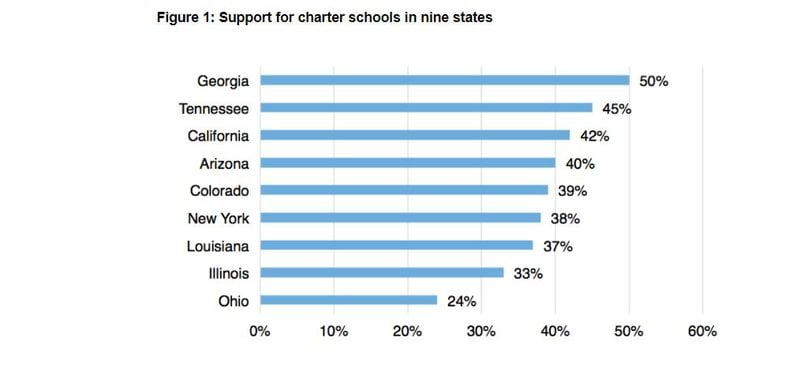Why are charter schools more popular in some states than others?
That question gained relevance after the 2017 Education Next survey on K-12 education documented a steep slide in the public's view of charter schools. This year, 39 percent of respondents said they support "the formation of charter schools," down from 51 percent in 2016.
The decline intrigued Mike Petrilli, president of the pro charter Thomas B. Fordham Institute, and even more so after he examined unpublished data from a different survey that included a charter school question in a recent sampling of states, including Georgia.
As Petrilli wrote on his blog: (He goes into detail so please read his blog if this topic interests you.)
The question put to a representative sample of registered voters was: "Please indicate whether you support or oppose creating more charter schools—public schools run by private companies or nonprofit organizations—to compete with traditional public schools." You don't have to be a charter school apologist or polling expert to see that this question is worded in a very charter-unfriendly way...But it doesn't seem to matter because the survey found that 40 percent of Americans support charters, virtually identical to the 39 percent identified by Education Next with a question worded much more fairly.
Of the sampled states, Georgia showed the greatest public support for charters at 50 percent, as shown in this Fordham illustration.
Credit: Maureen Downey
Credit: Maureen Downey
Why would Georgians support charters in higher numbers than voters in other states?
Petrilli ruled out political leanings, given the mix of red and blue states at the top. He also doubted it was school quality. Of the states on the list, New York leads in charter quality, while charters in Georgia perform about the same as traditional public schools.
Credit: Maureen Downey
Credit: Maureen Downey
Then, Petrilli looked at charter school students eligible for free or reduced price lunch in each state. What he found: Generally, the greater degree to which charters served poor students, the less public support was expressed. Conversely, more middle-class students in charters meant more support. (That same dynamic of serving both middle-class and low-income kids explains the deep public support in Georgia for the HOPE Scholarship.)
"Georgia’s traditional public schools serve a higher proportion of low-income students than Georgia’s charter schools do — a difference of 6 percentage points," writes Petrilli. "In Ohio, meanwhile, traditional public schools on average have 30 percentage points fewer students eligible for free or reduced price lunch than do charter school peers. "
Petrilli concludes:
Second, it might tell us about how the public views schools. Voters might perceive "schools for poor kids" as low-quality schools. That is of course unfair and prejudiced, but it may reflect the reality of public opinion.
Third, and less cynically, perhaps when charter schools serve a broader population, including middle class kids in the suburbs, more people come into contact with them. And familiarity breeds positivity.
I emailed Petrilli to ask whether press coverage of failing charters or charter school scandals might play a role. (Ohio’s charters -- with the least public support in the state sampling -- don't perform well overall, and there's been a lot of media attention on their dismal achievement. )
While he had considered looking at negative press coverage, Petrilli said the analysis proved too time-consuming, but added, "I agree that it likely is a factor, certainly in Ohio. Of course, the Ohio charter schools deserve it."
Petrilli stressed this is not a scientific finding, but food for thought about why some states would have a greater appetite for charters than others.
What are your thoughts?
About the Author









